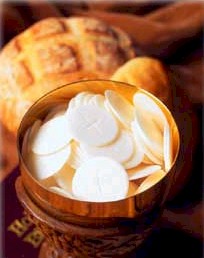21st Sunday in Ordinary - Understanding and Belief
The human story is one filled with broken dreams. Created in the image of God, we can fashion marvelous possibilities of success, fame and pleasure, and spend much of our time and effort trying to make at least some of these dreams come true. But we will always encounter along the way people or circumstances that will shatter those dreams. Our dreams will or will not be realized based on the decisions that we make which determine the course of our lives. We are faced with these decisions every day.
 In today's gospel we experience a similar moment of decision faced by Jesus' disciples. Will they continue to follow him in a way that will bind them together as a chosen community – called by name; diverse, yet one people? Their decision will not only bind them to Jesus, but to each other and will also affect each and every day of their lives.
In today's gospel we experience a similar moment of decision faced by Jesus' disciples. Will they continue to follow him in a way that will bind them together as a chosen community – called by name; diverse, yet one people? Their decision will not only bind them to Jesus, but to each other and will also affect each and every day of their lives.
Jesus has already spoken to them about coming down from heaven and having to return there. His listeners certainly understood his claim to be sent by the Father. He says he is the bread that has come down from heaven. But more immediately, he has told them that they must eat his flesh and drink his blood.
And as we listen to the text from John, we are told that many of Jesus' disciples found his teaching too hard asking, "who can accept it?" Later we learn that, "...many of his disciples returned to their former way of life." The Jews, including many of his disciples, took exception to what he had just told them and so they turn away from him.
Jesus doesn’t make any attempt to soften his words, to make his message more palatable. No words can do that, for what he says about eating his flesh and drinking his blood is offensive to many of those present and too much for them to absorb. There is nothing logical in what he says, nor is there anything natural or innate in us who hear his words today that will help us understand what he means.
Peter and the Twelve are committed to Christ, they will stay with him because, as Peter puts it, "We have come to believe and are convinced that you are the Holy One of God." But they only have partial vision at this point, and there is much more to see and believe in Christ. Until Jesus returns to the Father and sends the Spirit, their understanding is partial, their knowledge incomplete.
Jesus is nothing like the Messiah Peter and others are expecting. At this point, Peter believes he knows who Jesus is; but it is only when they receive the Spirit that they will "come to believe." Likewise, Jesus is nothing what we expect and what we believe He is.
We are coming to the end of another summer and we look ahead to the beginning of another year and, perhaps, a different experience of preaching, teaching, praying and worshipping, meeting and sharing, reaching out and serving others. As we continue to struggle with the global pandemic, we who gather at Eucharist will have the opportunity to once again grasp the vision that Jesus promised. We have been "born from above;" so we see what mere human vision cannot show us. We believe that Jesus is the Word made flesh, God's total act of communication with us. We, too, have come to believe the Jesus is the Holy One of God. But do we truly understand that proclamation of belief?
We are not waiting for God's promise of redemption to be fulfilled. Rather, we are supposed to be living as people who have already experienced the incredible goodness of God... people who have been given a promise and people who are living the dream.
It is the Spirit who enables us to comprehend Jesus' words, accept them in faith and then receive and live the life they give. It is the Spirit who gifts us with the faith to recognize the flesh and blood of Christ in the bread we eat and the wine we drink today. But like those in the Gospel today, the decision to listen, to comprehend, to live and to dream, is the difference between understanding and belief.